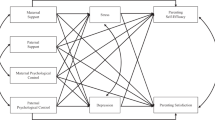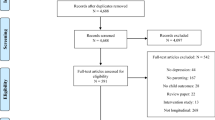Abstract
This study examines the effect of a history of childhood maltreatment (CM) on parenting sense of competence, taking into account the influence of resilience and postpartum depressive symptoms as moderators of this relationship. Participants (N = 131) were a community sample of women recruited into a larger study of maternal childhood maltreatment. Women completed questionnaires over the phone at 4 months postpartum and parenting sense of competence (PSOC) was assessed during a home visit at 6 months postpartum. A three-way interaction emerged; women with low depression and high resilience factors maintained high levels of PSOC, even when they had a CM history. In contrast, among women with one postpartum risk factor (depression or low resilience) CM was associated with decreased PSOC. Results suggest that a mother’s well-being postpartum moderates the effect of a childhood maltreatment history on her parenting sense of competence. Reducing postpartum depressive symptoms and enhancing resilience may be important components for interventions that address parenting confidence with maltreated women.

Similar content being viewed by others
References
Aiken LS, West SG, Reno RR (1991) Multiple regression: Testing and interpreting interactions. Sage
Bailey HN, DeOliveira CA, Wolfe VV, Evans EM, Hartwick C (2012) The impact of childhood maltreatment history on parenting: A comparison of maltreatment types and assessment methods. Child Abuse Negl 36(3):236–246
Bagley C, Mallick K (1997) Self-esteem and religiosity: Comparison of 13-to 15-year-old students in Catholic and public junior high schools. Can J Educ/Revue canadienne de l'éducation 22(1):89–92
Banyard VL (1997) The impact of childhood sexual abuse and family functioning on four dimensions of women’s later parenting. Child Abuse Negl 21(11):1095–1107
Banyard VL, Williams LM, Siegel JA (2003) The impact of complex trauma and depression on parenting: an exploration of mediating risk and protective factors. Child Maltreatment 8(4):334–349
Beck CT, Gable RK (2000) Postpartum depression screening scale: development and psychometric testing. Nurs Res 49(5):272–282
Bernstein DP, Fink L (1998) Childhood trauma questionnaire: a retrospective self-report: manual. Psychological Corporation
Boyd RC, Le HN, Somberg R (2005) Review of screening instruments for postpartum depression. Archives Womens Ment Health 8(3):141–153
Caldwell JG, Shaver PR, Li CS, Minzenberg MJ (2011) Childhood maltreatment, adult attachment, and depression as predictors of parental self-efficacy in at-risk mothers. J Aggress Maltreat Trauma 20(6):595–616
Connor KM, Davidson JR (2003) Development of a new resilience scale: The Connor‐Davidson resilience scale (CD‐RISC). Depress Anxiety 18(2):76–82
Dennis CL (2005) Psychosocial and psychological interventions for prevention of postnatal depression: systematic review. Bmj 331(7507):15
DiLillo D, Damashek A (2003) Parenting characteristics of women reporting a history of childhood sexual abuse. Child Maltreatment 8(4):319–333
Fitzgerald MM, Shipman KL, Jackson JL, McMahon RJ, Hanley HM (2005) Perceptions of parenting versus parent-child interactions among incest survivors. Child Abuse Negl 29(6):661–681
Gross D, Fogg L, Tucker S (1995) The efficacy of parent training for promoting positive parent—toddler relationships. Res Nurs Health 18(6):489–499
Hess CR, Papas MA, Black MM (2002) Resilience among African American adolescent mothers: Predictors of positive parenting in early infancy. J Pediatr Psychol 27(7):619–629
Johnston C, Mash EJ (1989) A measure of parenting satisfaction and efficacy. J Clin Child Psychol 18(2):167–175
Jones TL, Prinz RJ (2005) Potential roles of parental self-efficacy in parent and child adjustment: a review. Clin Psychol Rev 25(3):341–363. https://doi.org/10.1016/j.cpr.2004.12.004
Kettunen P, Koistinen E, Hintikka J (2014) Is postpartum depression a homogenous disorder: time of onset, severity, symptoms and hopelessness in relation to the course of depression. BMC Pregnancy Childbirth 14(1):402
Lang AJ, Gartstein MA, Rodgers CS, Lebeck MM (2010) The impact of maternal childhood abuse on parenting and infant temperament. J Child Adolesc Psychiatr Nurs 23(2):100–110
Levine L, Coll CTG, Oh W (1985) Determinants of mother-infant interaction in adolescent mothers. Pediatrics 75(1):23–29
MacMillan HL, Fleming JE, Streiner DL, Lin E, Boyle MH, Jamieson E, Duku EK, Walsh CA, Wong MYY, Beardslee WR (2001) Childhood abuse and lifetime psychopathology in a community sample. Am J Psychiatr 158(11):1878–1883
Martinez-Torteya C, Dayton CJ, Beeghly M, Seng JS, McGinnis E, Broderick A, Muzik M (2014) Maternal parenting predicts infant biobehavioral regulation among women with a history of childhood maltreatment. Dev Psychopathol 26(02):379–392
Mercer RT, Hackley KC, Bostrom A (1984) Adolescent motherhood: comparison of outcome with older mothers. J Adolesc Health Care 5(1):7–13
Mguni N, Bacon N, Brown JF (2012) The wellbeing and resilience paradox. The Young Foundation, London
Michl LC, Handley ED, Rogosch F, Cicchetti D, Toth SL (2015) Self-criticism as a mechanism linking childhood maltreatment and maternal efficacy beliefs in low-income mothers with and without depression. Child Maltreatment 20(4):291–300
Miller-Heyl J, MacPhee D, Fritz JJ (1998) DARE to be you: A family-support, early prevention program. J Prim Prev 18(3):257–285
Moehler E, Biringen Z, Poustka L (2007) Emotional availability in a sample of mothers with a history of abuse. Am J Orthopsychiatry 77(4):624–628
Morelen D, Menke R, Rosenblum KL, Beeghly M, Muzik M (2016) Understanding bidirectional mother-infant affective displays across contexts: effects of maternal maltreatment history and postpartum depression and PTSD symptoms. Psychopathology 49(4):305–314
Mowbray CT, Bybee D, Hollingsworth L, Goodkind S, Oyserman D (2005) Living arrangements and social support: Effects on the well-being of mothers with mental illness. Soc Work Res 29(1):41–55
Muzik M, Marcus SM, Heringhausen JE, Flynn H (2009) When depression complicates childbearing: guidelines for screening and treatment during antenatal and postpartum obstetric care. Obstet Gynecol Clin N Am 36(4):771–788
Muzik M, Ads M, Bonham C, Lisa Rosenblum K, Broderick A, Kirk R (2013) Perspectives on trauma-informed care from mothers with a history of childhood maltreatment: a qualitative study. Child Abuse Negl 37(12):1215–1224
Muzik M, Rosenblum KL, Alfafara EA, Schuster MM, Miller NM, Waddell RM, Kohler ES (2015) Mom power: preliminary outcomes of a group intervention to improve mental health and parenting among high-risk mothers. Arch Womens Ment Health 18(3):507–521
Ohan JL, Leung DW, Johnston C (2000) The parenting sense of competence scale: evidence of a stable factor structure and validity. Can J Behav Sci/Revue canadienne des sciences du comportement 32(4):251–261
Pazdera AL, McWey LM, Mullis A, Carbonell J (2013) Child sexual abuse and the superfluous association with negative parenting outcomes: the role of symptoms as predictors. J Marital Fam Ther 39(1):98–111
Pergament K (1997). The psychology of religion and coping: theory, research, practice, 59–79
Roberts R, O’Connor T, Dunn J, Golding J, ALSPAC Study Team (2004) The effects of child sexual abuse in later family life; mental health, parenting and adjustment of offspring. Child Abuse Negl 28(5):525–545
Sameroff A, Seifer R, McDonough SC (2004) Contextual contributors to the assessment of infant mental health. In DelCarmen-Wiggins R, Carter A (Eds) Handbook of infant, toddler, and preschool mental health assessment. Oxford University Press, New York, pp 61–76
Scher CD, Stein MB, Asmundson GG, McCreary DR, Forde DR (2001) The childhood trauma questionnaire in a community sample: psychometric properties and normative data. J Trauma Stress 14(4):843–857
Schuetz P, Eiden RD (2005) The relationship between sexual abuse during childhood and parenting outcomes: modeling direct and indirect pathways. Child Abuse Negl 29:645–659. https://doi.org/10.1016/j.chiabu.2004.11.004
Schulz A, Becker M, Van der Auwera S, Barnow S, Appel K, Mahler J, Schmidt CO, John U, Freyberger HJ, Grabe HJ (2014) The impact of childhood trauma on depression: Does resilience matter? Population-based results from the Study of Health in Pomerania. J Psychiatr Res 77(2):97–103
Seltmann LA, Wright MOD (2013) Perceived parenting competencies following childhood sexual abuse: a moderated mediation analysis. J Fam Violence 28(6):611–621
Seng JS, Low LMK, Sperlich M, Ronis DL, Liberzon I (2009) Prevalence, trauma history, and risk for posttraumatic stress disorder among nulliparous women in maternity care. Obstet Gynecol 114(4):839–847
Seng JS, Sperlich M, Low LK, Ronis DL, Muzik M, Liberzon I (2013) Childhood abuse history, posttraumatic stress disorder, postpartum mental health, and bonding: a prospective cohort study. J Midwifery Womens Health 58(1):57–68
Sexton MB, Hamilton L, McGinnis EW, Rosenblum KL, Muzik M (2015) The roles of resilience and childhood trauma history: main and moderating effects on postpartum maternal mental health and functioning. J Affect Disord 174:562–568. https://doi.org/10.1016/j.jad.2014.12.036
Shumow L, Lomax R (2002) Parental self-efficacy: predictor of parenting behavior and adolescent outcomes. Parenting: Science and Practice 2:127–150. https://doi.org/10.1207/S15327922PAR0202_03
Slagt M, Deković M, de Haan AD, van den Akker AL, Prinzie P (2012) Longitudinal associations between mothers’ and fathers’ sense of competence and children’s externalizing problems: the mediating role of parenting. Dev Psychol 48(6):1554–1562. https://doi.org/10.1037/a0027719
Teti DM, Gelfand DM (1991) Behavioral competence among mothers of infants in the first year: the mediational role of maternal self-efficacy. Child Dev 62:918–929. https://doi.org/10.1111/j.1467-8624.1991.tb01580.x
Wingo AP, Ressler KJ, Bradley B (2014) Resilience characteristics mitigate tendency for harmful alcohol and illicit drug use in adults with a history of childhood abuse: A cross-sectional study of 2024 inner-city men and women. J Psychiatr Res 51:93–99
World Health Organization. (2016) Child maltreatment factsheet. Media center. <http://www.who.int/mediacentre/factsheets/fs150/en/>
Zuravin SJ, Fontanella C (1999) Parenting behaviors and perceived parenting competence of child sexual abuse survivors. Child Abuse Negl 23(7):623–632
Funding
This research was conducted at the University of Michigan supported by the National Institute of Health-Michigan Mentored Clinical Scholars Program awarded to M Muzik (K12 RR017607-04, PI: D. Schteingart); the National Institute of Mental Health - Career Development Award K23 (NIH, PI: Muzik); and the Michigan Institute for Clinical and Health Research (MICHR, UL1TR000433, PI: Muzik).
Author information
Authors and Affiliations
Corresponding author
Ethics declarations
Conflict of interest
The authors declare that they have no conflict of interest.
Rights and permissions
About this article
Cite this article
Martinez-Torteya, C., Katsonga-Phiri, T., Rosenblum, K.L. et al. Postpartum depression and resilience predict parenting sense of competence in women with childhood maltreatment history. Arch Womens Ment Health 21, 777–784 (2018). https://doi.org/10.1007/s00737-018-0865-7
Received:
Accepted:
Published:
Issue Date:
DOI: https://doi.org/10.1007/s00737-018-0865-7




